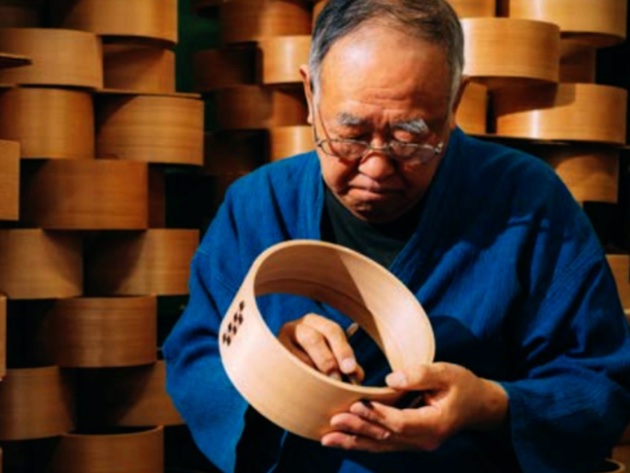
The exhibition Magewappa di Ōdate - L’Estestica della tradizione giapponese (Ōdate’s Magewappa - The Aesthetics of Japanese Tradition) at the Japan Cultural Institute focuses on magewappa (literally "bent wood"), high-quality handcrafted objects made from sugi wood, a Japanese cedar native to Akita Prefecture, particularly the city of Odate in northern Japan. This technique, dating back over a thousand years, involves hot bending wood to create objects primarily intended for food use: primarily bentō (traditional Japanese lunch boxes), but also sake glasses, trays, jewelry holders, and containers for small objects. In the late 17th century, during the Edo period (1603–1868), the production of magewappa was encouraged as a secondary activity for low-ranking samurai and later developed as part of the local industry.
Among the most appreciated features of these objects are the scent of cedar wood and their elegant appearance; a natural grain pattern also enhances their authenticity and refined craftsmanship. Despite the high-quality materials and the sturdiness afforded by the traditional folding technique, these objects are surprisingly light, making them extremely practical, as well as aesthetically pleasing.
The exhibition features artisans Ito Tomoko, Nakazawa Eri, Shibata Yoshimasa, Kurimori Shunji, and Narita Toshimi with their magewappa. Also featured are works by renowned artist Hirai Tomo, who has reinterpreted these objects by fusing them with elements of Faenza ceramics, an art form he specialized in during his long time in Italy. His original creations thus represent a deep dialogue between cultures, in which the sober lines of the magewappa armonize themselves with the brilliance and vibrant colors of Italian majolica, in a perfect synthesis.
Finally, we would like to remind you that, in conjunction with the exhibition, two conferences on the topic will be held between September and October at the Japanese Cultural Institute in Rome: on September 19, 2025, by Dr. Claudia Casali, director of the International Museum of Ceramics in Faenza (scheduled time: 6:00 PM – 8:00 PM); on October 3, 2025, by Dr. Marco Del Bene, professor at the University of Rome “La Sapienza” (scheduled time: 6:00 PM – 8:00 PM).
Photo: official poster of the exhibition
Informations
 Condividi
Condividi












































